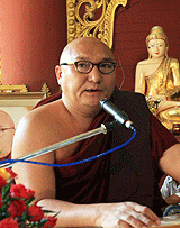Ashin Pyinna Thiha is a prominent Buddhist monk and the abbot of a monastery in Kyeemyindine Township in Rangoon, which has recently become a popular venue for political events. The 47-member Maha Nayaka Sangha Council, Burma’s official state council of Buddhist monks, had previously banned him from giving Dhamma talks for one year. In September, he spoke at the Mandalay office of Aung San Suu Kyi's National League for Democracy (NLD), where he called for national unity and emancipation from fear under Burma's new nominally-democratic government. A recorded video of the event spread among the Burmese public, and apparently citing this video, the Maha Nayaka Sangha Council issued a statement saying that the abbot was “disobedient” within the monk community and was to be evicted from his monastery. The news of Ashin Pyinna Thiha's potential humiliation sent shockwaves across Rangoon and supporters have gathered at his monastery to show their concern. He still remains in his monastery and has sent a letter of apology to the council asking that it reverse its decision.
Linn Thant, a reporter for The Irrawaddy, talked with Ashin Pyinna Thiha about the ongoing case and his future.
 |
| Ashin Pyinna Thiha |
Question:
The Maha Nayaka Sangha Council said you are a “disobedient” monk? What does that mean to you? Answer: There is a misunderstanding here. It doesn't mean a serious breach of discipline. Being condemned as disobedient means that you are not following the teachings of senior monks of the Maha Nayaka Sangha Council. That is what their decision is about, which I think is very much reflected by the reports submitted by the lower level of the council to the senior monks about my case.
Q: Have you been summoned to meet with the senior monks of the Maha Nayaka Sangha Council since the decision that you were "disobedient" was made?
A: No. They can summon me at anytime, as I am not a "bad monk." They should really consider the fact that I am one of the leading monks and have devoted all my life to the propagation of Sasana (Buddhist Teachings) and the society as a whole. I have no intention of insulting the senior monks who are higher than me in terms of their age, dignity, morality, integrity and wisdom. Unless we are unified, our Sasana and our race will be in danger, that is what I am worried most about. My apology letter to the senior monks is based on my true intention of unifying all senior and junior monks. I will apologize according to our Theravada tradition and I don't want to say whether or not I am right. All I am doing is extending my apology. I love my country very much. For that, I don’t want to do anything to harm my people, my country or my Sasana.
Q: When did the one-year ban from delivering Dhamma talks start?
A: I have been banned from delivering Dhamma talks in Burma from Feb. 11, 2011 to Feb. 10, 2012. It was just because we hold different points of view. Being a teaching monk for thousands of young monks, when I speak my voice can be hard or tough, but I speak straight and righteously. I prefer to use a strong tone in preaching the Dhamma. I can honestly admit that I can make mistakes like others do, as people hold different points of view on certain things. But I can assure that I love my people and my Sasana more than anything else. If asked what I have done wrong, I would say "nothing."
Q: Was there any particular talk that led to your ban?
A: It was not any particular talk but applied to all of my talks. We may have different opinions or beliefs. I say things which I believe are righteous and I take full accountability for what I have done. Because of the ban, I haven't delivered any talks. I was invited to give admonitions, but this is not a time we should harvest disagreement among our monk community, especially with the authoritative senior monks. Our disunity won’t bring a benefit. It is the time we all monks should be unified for the sake of our country, people and Sasana. I therefore decided to apologize to the senior monks. It is because I love my country and my people.

